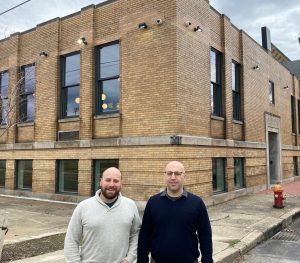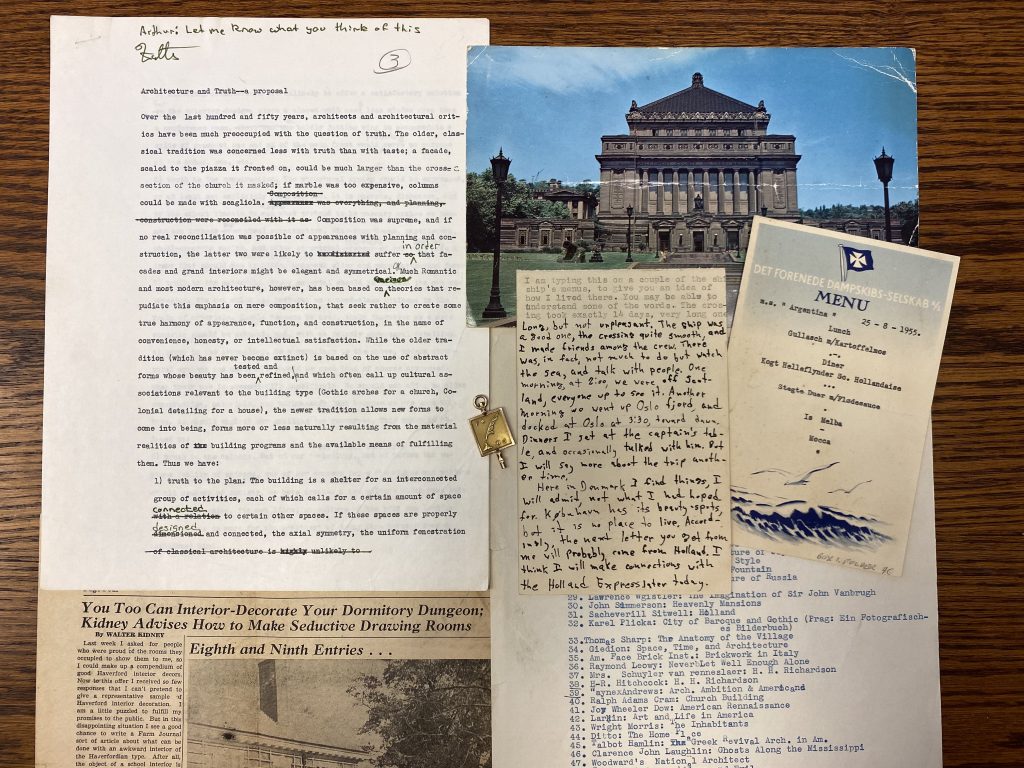
Category Archive: PHLF News
-
Internship Spotlight: Reflecting on the History of the Fifth-Forbes Preservation Battle
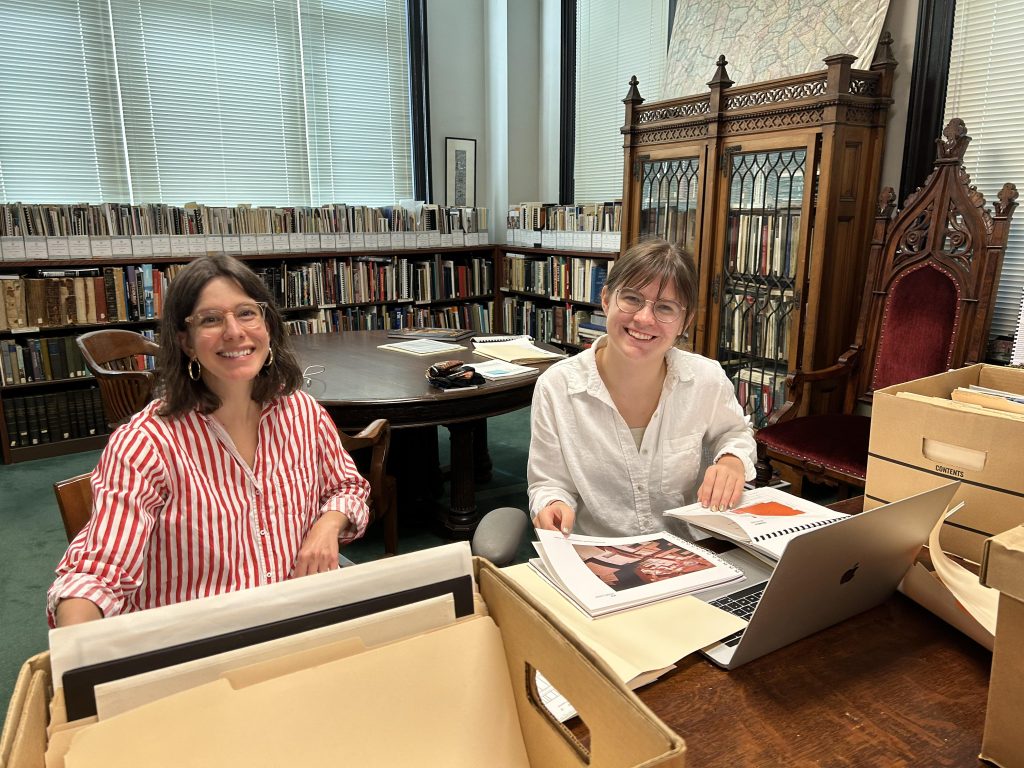
PHLF Archivist Anna Samuels (left) and Zoe Trexel (right), a library intern from Kenyon College, spent the summer 20024 processing our organization’s collection of files of the Fifth-Forbes preservation battle.
Over the summer, our organization welcomed Zoe Trexel, an anthropology major at Kenyon College in Gambier, Ohio, to work alongside our Archivist Anna Samuels in the James D. Van Trump Library & Archives.
Zoe helped to review and reprocess the Fifth & Forbes Collection which highlights the preservation battle surrounding our organization’s opposition to former Mayor Tom Murphy’s plan for Downtown Pittsburgh, which would have seen the demolition of 64 buildings in Downtown.
In this essay, Zoe reflects about the ways in which her background in anthropology informed her understanding of Pittsburgh’s preservation history.
———————————————————————————————————————
By Zoe Trexel
After visiting a few of my college friends’ hometowns, we started describing ourselves as “place-memory people.” This invented phrase encapsulates how deeply we as individuals value our hometowns, typical local haunts, and the landmarks of our childhoods.
Growing up in Pittsburgh was certainly a formative experience. It is impossible to explore the city without understanding how the contours of the landscape, and the skeleton left behind by its industrial history, partition an already small city into even smaller neighborhoods with their own character. I treasure all the quirky neighborhoods, eccentric traditions and the distinctive “yinzer” vocabulary. I have learned to love it even more as I have been able to share it with other people. Pittsburgh is particularly remarkable because of the contradictions ingrained within its culture, the most evident being the importance of its past and the simultaneous trend towards some vague idea of “modernization.”
This summer, I was given the opportunity to explore this juxtaposition in the archives of the Pittsburgh History & Landmarks Foundation. Each day, I delved into documents that connected my love of my hometown to my anthropological interest in the desire to preserve the past societies and structures for posterity. The particular collection I dealt with centered around the Fifth and Forbes controversy, in which former Pittsburgh Mayor Tom Murphy proposed a plan that would have destroyed a significant number of historical buildings and removed many local small businesses in favor of a vast mall contracted through a Chicago developer.
At first, sorting through the documents seemed like a somewhat daunting task. Without a full understanding of all the different factions and individuals with a stake in the fight against Murphy’s plan, it was unclear exactly how the documents fit together. However, as I read through the archival material, the story started to piece itself together.
The deal intended to take advantage of Pittsburgh’s push towards progress to the detriment of its own citizens and integrity. As I explored further, it became clear to me that the Pittsburgh History & Landmarks Foundation played a pivotal role in this narrative and I was fortunate enough to work in the very office that pushed back against Murphy’s plan. After completing the project, I reorganized the collection’s archival system in a more logical manner. The main characters of this battle, from large task forces and powerful politicians to private citizens with an interest in the survival of this city, were put at the forefront of the new organizational system.
As an anthropology major at Kenyon College, I feel that historic preservation battles such as Fifth and Forbes can be better understood through an anthropological lens. Place is important to humans because it marks the way we interact with our worlds and to others. In the same sense that archaeologists attempt to understand the lives of past societies by studying their spaces, we are able to use the same methodology to gain a broader understanding of the intricacies of our everyday lives and what it means to inherit structures past generations have created. The push to maintain as many historical façades as possible and preserve local businesses highlights a reverence for Pittsburgh’s past and a concurrent yet seemingly contradictory dedication to its future.
I believe this not to be a glorification of the industrial city that came before, but a realization of the need to maintain the physical structures of the past in order to understand how we have arrived at the present moment. The spaces we inhabit not only inform us about our way of life but dictate it, thus permeating human memory and allowing us to cherish others and the lives we’ve lived in these spaces.
-
Layers of History: Adaptive Reuse With Financing Through Landmarks Community Capital
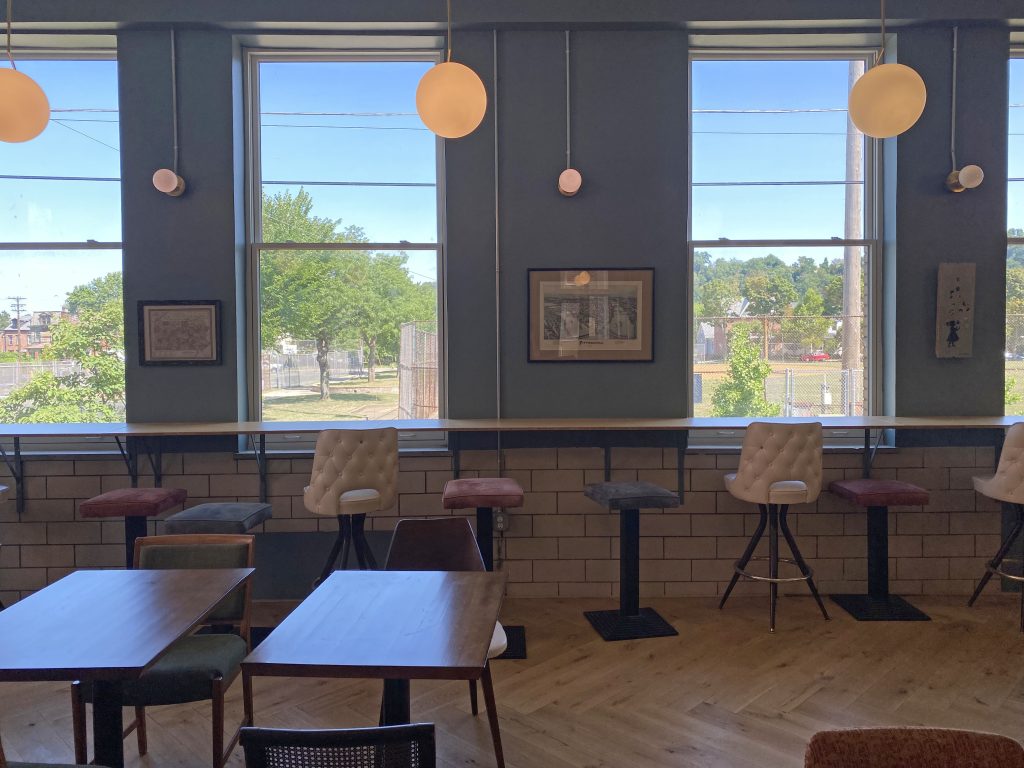
The café space at Fulton Common features original yellow brick along the interior perimeter of the building, and a white oak floor with wood sourced from the Allegheny Forest.
Brian and Irwin Mendelssohn, the brothers behind Botero Development, are no strangers to working with historic buildings. The duo owns a variety of redeveloped properties including Row House Cinema, a single-screen movie theater in what was once a narrow house, and the Lawrenceville Market House, a shared-retail space in a former Mellon Bank building across the street. When they set their sights on Manchester, it made sense that they’d choose a historic property.
A co-working and kitchen incubator space, Fulton Commons, was originally built as the St. Joseph’s Elementary School in 1947 and later housed St. Vincent de Paul offices, and Botero has paid homage to the yellow-brick building’s history by highlighting and supplementing its architectural and design features.
The brothers are drawn to historic buildings not only because of their interesting architecture, but also because of the challenge they present. When working with a new building, there’s a template in place, but with a historic building there are constraints that force you to add your own layers of history and beauty, Irwin Mendelssohn, explained recently.
Those “layers of history,” are easy to see in the features of the redeveloped historic building that is Fulton Commons. The building’s original features like its tin ceiling tiles uncovered during renovation; its yellow brick which runs around the perimeter of the space, and its 1940s-era classroom doors on select offices, offer it a distinctive historic aesthetic.
In addition to highlighting the building’s original features, the Mendelssohn brothers added a distinctive touch of their own to augment a sense of historic feeling to the building. This included wood floors made from white oak sourced from the Allegheny Forest and a touch of vintage décor. One set of arm chairs, for example, features repurposed fabric patches from Old Flame Mending, a Pittsburgh-based sewing service.
Fulton Commons, which opened in July 2020, in part, thanks to an $833,000 construction loan from Landmarks Community Capital— a non-profit lending subsidiary of the Pittsburgh History & Landmarks Foundation— is open to its members 24-hours a day.
The building features a combination of offices, dedicated desks, and open-seating options in six spaces, which range from Art Deco Miami- to 1940s-era Schoolhouse-style. The kitchen incubator at Fulton Commons is the largest shared kitchen space in the city and offers dedicated prep stations and storage space.
Located at 1546 Fulton Street, Fulton Commons is a contributing resource to the Manchester City Designated Historic District. Its adaptive reuse was financed in part by Landmarks Community Capital, a Community Development Financial Institution (CDFI), certified by the United States Department of the Treasury.
-
An Update From Our Archives: Rehousing Project Completed
Our organization has completed a grant-funded records rehousing project that allowed us to review, reprocess, and rehouse the papers of three former PHLF staff members: founding Chairman Charles C. Arensberg and architectural historians James D. Van Trump and Walter C. Kidney.
Over the past year and a half, Archivist Anna Samuels and two interns from Duquesne University’s Public History graduate program reviewed materials and transferred all documents to acid-free folders and boxes, reorganized materials as necessary, and digitized fragile manuscripts. By rehousing the collections, we’ve ensured that these materials will be preserved for years to come.
Charles C. Arensberg was PHLF’s founding chairman and served on the board for 30 years. His collection offers a fascinating behind-the-scenes glimpse into the founding and early operations of the foundation. Highlights include Arensberg’s “Chairman’s Ramble” column that ran in our PHLF newsletter, assorted letters to the editor he authored, and materials related to his tenure on the National Trust of Historic Preservation’s Board of Advisors.
Walter C. Kidney served as PHLF’s architectural historian for nearly 20 years and his collection contains correspondence, research and manuscripts. During her internship, Katie Ploger discovered some hidden gems within the collection: “Shuffled in the correspondence and in later boxes of the collection were more personal things that belonged to [Kidney]. Letters to friends and family, mementos of childhood and travel, and other personal belongings could be found within the collection. One of the most eye catching and interesting of these documents is a letter from Walter to his parents in the 1950s on the ship “Argentina” on a voyage to Denmark. The letter is written on the backs of two ships menus featuring broiled halibut, fried pigeon in a cream sauce, and roast pork with red cabbage.”
James D. Van Trump was co-founder and PHLF’s first architectural historian. Intern Hannah LeComte reviewed correspondence, research materials, photographs, and handwritten manuscripts, noting themes of “urban development and ‘renewal’ in industrial and deindustrializing cities, historic preservation and the field’s connection to the environmental movement, and documentation of grassroots efforts to determine which sites deserve protection and preservation.” LeComte reflected on her work with the collection, writing, “Housing some of the foremost scholarship on the history of Pittsburgh architecture and development, the Van Trump Papers provide a unique way to study architectural history and historic preservation efforts in Pittsburgh and connect these efforts to broader trends in 20th Century United States history. The personal papers of James Van Trump integrate a human element to his extensive scholarship and provide insight into his motivations and desires as a researcher, advocate, teacher, and friend.”
The Charles C. Arensberg, Walter C. Kidney, and James D. Van Trump Collections are available for members and researchers to access in the James D. Van Trump Library in the PHLF offices. Contact archivist Anna Samuels (anna@phlf.org; 412-471-5808 ext. 542) to set up an appointment to visit the archives.
This project was supported by a grant from the Pennsylvania Historical & Museum Commission’s Historical Archives & Records Care Grant, a program funded by the Commonwealth of Pennsylvania.
-
Three Scholarships and Ten Honorable Mentions Awarded in 2024 Cycle
Our organization has awarded three scholarships and 10 Honorable Mention-awards to college-bound students in Allegheny County, who care deeply about the history and distinctive built environment of our city and region.
The scholarship award of $6,000 is payable over four years, while the Honorable Mention award is a one-time gift of $250, payable to the recipient’s college or university for tuition and book expenses.
At its meeting on May 17, the Landmarks Scholarship Committee awarded scholarships to:
- Isabel Concepcion of Woodland Hills High School, who will attend the University of Pittsburgh;
- Rena Gilligan of Quaker Valley High School, who will attend Stonehill College, and
- Daniel Kelly of Pittsburgh Carrick, who will attend York College of Pennsylvania.
Our Honorable mention recipients are:
- Elliott McInnes (Pittsburgh Obama High School/Temple University);
- Dylan Berman (Fox Chapel Area High School/Vassar College);
- Louis Mariano (Montour High School/University of Pittsburgh);
- Kendall McKelvey (Northgate High School/Oberlin College);
- Raelle Wilshire (Blackburn Study Center Homeschool/Grove City College);
- Dimajio Bailey-Locante (Keystone Oaks High School/Slippery Rock University);
- Angel Qu (North Allegheny Senior High School/Rice University);
- Luke McDonough (Upper Saint Clair High School/New York University);
- Brendan Harris (Baldwin High School/University of Notre Dame);
- Max McCarran (Shady Side Academy/Dartmouth College).
The awards will be presented during a private reception on Thursday, June 20, where we look forward to meeting our award winners together with their families.
Launched in 1999, our organization has so far awarded 91 scholarships and 69 Honorable Mentions to high school graduates from Allegheny County who care deeply about the Pittsburgh region and are pursuing an undergraduate degree at a college or university of their choice. The Scholarship Program has helped introduce young people to the work and mission of our organization and has created a network of support and sense of family among the recipients.
Applicants are asked to write about a place in Allegheny County that is meaningful to them. David Brashear, who chairs the Scholarship Committee, said this year’s essays were, as usual, “outstanding and insightful.” They featured essays on places, which included Phipps Conservatory, Monongahela Incline, St. Paul’s Evangelical Lutheran Cemetery, Riverview Park, Hartwood Acres, Mellon Park, Acrisure Stadium, Benedum Center, Muslim Community Center of Greater Pittsburgh, and Rosedale Beach Club. The essays from all the applicants are bound and archived at PHLF.
Mr. Brashear’s family initiated the Landmarks Scholarship Program in 1999 through a Donor-Advised Fund at PHLF. Foundations, businesses, and many PHLF members have generously contributed since then.
We welcome contributions in support of the Landmarks Scholarship Program. Please click here to contribute; be sure to designate your gift to “Scholarship.”
Thank you!
-
Landmarks Scholarship Program Marks 25 Years
We are pleased to announce that our Landmarks Scholarship Program, now celebrating 25 years of recognizing high-achieving, community-minded, college-bound students in Allegheny County who care deeply about the Pittsburgh region, has awarded three scholarships and eight honorable mentions to students as part of the 2023 program.
We look forward to celebrating these students’ achievements together with their families in an afternoon reception, which will be in the dining room of the Grand Concourse Restaurant in Station Square on July 12.
Our Landmarks Scholarship recipients are:
- Emily Barrie (Upper St. Clair High School/University of Virginia);
- Andrew McLaughlin (North Allegheny Senior High School/University of Pittsburgh); and
- Nelson Morris (Pittsburgh Westinghouse/Penn State University).
The scholarship award of $6,000 is payable over four years to the recipient’s college/university to help pay tuition and book expenses.
Our Honorable mention recipients are:
- Taylor Billet (Riverview Jr.-Sr. High School/Ohio University);
- Kendal Chilcoat (Pine-Richland High School/University of Pittsburgh);
- Dylan Folan (Pittsburgh CAPA/University of Pennsylvania);
- Maya Leyzarovich (Shady Side Academy/University of Pennsylvania);
- Lindsey Storey (Gateway High School/University of Pittsburgh);
- Annali Thomas (Thomas Jefferson High School/Slippery Rock University);
- Sejal Verma (South Fayette High School/Purdue University); and
- Brayden Wisniewski (Avonworth High School/Savannah College of Art & Design).
The Honorable mention award is a one-time gift of $250, payable to the student’s college/ university to help pay for tuition and book expenses.
We thank the trustees and members of our organization who have served on the Landmarks Scholarship Committee, and especially David Brashear, who as chair of the committee for 25 years, shepherded this program, which helped introduce young people to the work and mission of our organization. Two former scholarship recipients have served as trustees of PHLF––Todd Wilson and Kezia Ellison––and many others contribute their time and expertise as members.
Our organization has awarded 88 scholarships and 59 honorable mentions to high school graduates from Allegheny County since the creation of this scholarship program in 1999. Applicants are asked to write about a place in Allegheny County that is meaningful to them.
The essays this year were outstanding and insightful. Featured places included the Gilfillan Farm in Upper St. Clair, the Homewood neighborhood, Allegheny County Courthouse, Bridge of Sighs, the former Pittsburgh Athletic Association clubhouse, St. Nicholas Church in Millvale, Carnegie Science Center, Mister Rogers statue on the North Shore, Frick Park Market, and Klavon’s Ice Cream Parlor. The essays from all the applicants are bound and archived at PHLF.
PHLF welcomes contributions in support of the Landmarks Scholarship Program. Please click here to contribute; be sure to designate your gift to “Scholarship.”
Thank you!
-
Architectural Design Challenge Helps Sixth Graders Imagine Reuse of Historic House
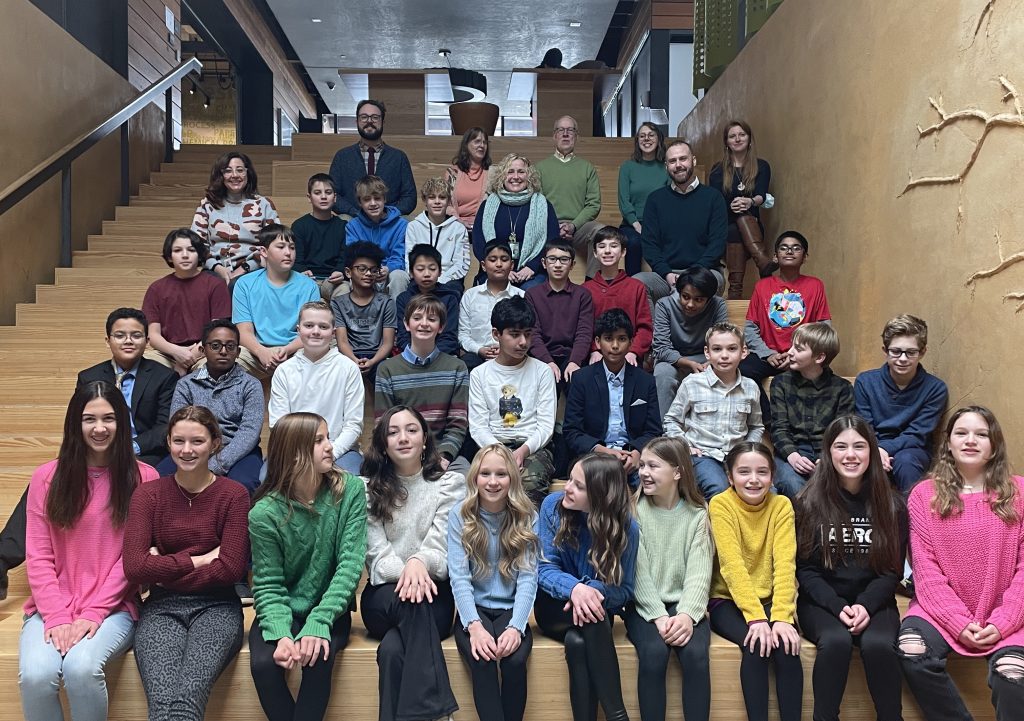
Gifted sixth-grade students from Eden Hall Upper Elementary in the Pine-Richland School District gather on the steps of the Esther Barazzone Center at Chatham University’s Eden Hall Campus after making final presentations in PHLF’s 8th Annual Architectural Challenge. Accompanying them are their teachers, the panel of architects who reviewed their work, and representatives of the Eden Hall Campus who were the students’ clients. Thirty-one gifted sixth-grade students from Pine-Richland School District’s Eden Hall Upper Elementary School presented design concepts for repurposing a 111-year-old house on the Eden Hall campus of Chatham University, on January 27.
The presentations were part of our Architectural Design Challenge, a component of our educational program to help young people imagine how to relate to our city and region’s architecture, and historic preservation of the built environment. As it has been in previous years, the Challenge site was the Morledge House—a roughly 1800-square-foot house and garage with a Dutch gambrel roof, located on the Eden Hall Campus.
This year, Pine-Richland teachers Joanna Sovek and Jennifer Kopach proposed a substantial change in the program. Instead of designing for whatever use suited their fancy, student teams would now work for a client that had specific programmatic requirements.
“The State of Pennsylvania’s academic standards include a career awareness component for our kids. We thought this program could provide a great opportunity to give students direct experience working in a creative, collaborative way that requires them to solve particular architectural problems,” said Ms. Sovek and Ms. Kopach.
The teachers’ idea meshed perfectly with the conditions on the Eden Hall Campus, which has been a valued partner since we created the program in 2015.
Kelly Henderson, K-12 education coordinator at Eden Hall, canvased colleagues there about the unfilled facilities needs in their departments. Together, they came up with three possible architectural programs for the eight student teams to wrangle out of the Morledge House:
- A recreational center where students could relax—whether passively, by simply “chilling,” or actively, through outdoor or indoor diversions.
- A bike shop, at which the campus’s bikes would be stored, rented, and repaired and where students could learn to fix bicycles.
- A space to support the farm team, which grows food that is used on campus and conducts research on agricultural sustainability.
Student teams met with the clients during the program to learn about what they needed or wanted, and to ensure that they were being responsive to the clients.
To make the Challenge even more realistic, students assumed specific roles that would be found on an architectural project with this scope and goals: LEED-certified architect, preservationist, landscape designer, interior designer, drafter/digital modeler, and project manager.
Students presented their projects to a panel of four architects (Ray Bowman, Nicole Cicconi, Paul Tellers, and Rob Zoelle) and two of the clients. Awards were presented in several categories that recognized the varied skills needed for complex architectural projects. The panel gave the award for Best Project Overall to the team calling itself Apex Architecture Firm, for “The Bike Barn.”
Inspired by the “casual-meets-elegant” aesthetic of so-called Wedding Barns, it maintained the building form and reinforced the structure to accommodate heavier loads; used reclaimed wood for storage furniture and other furnishings; and proposed use of a pulley system to move heavy boxes to the attic-level storage. Dr. Mary Whitney, Sustainability Director for Chatham University and the client for the bike shop program, was impressed by the team’s responsiveness to her feedback on its initial design. “I felt very heard: they really listened to what I told them!”
Ms. Kopach and Ms. Sovek were “beyond proud” of their students for the sophistication of their design solutions and the maturity with which the teams made their well-practiced presentations. By way of closing remarks, juror Paul Tellers, a PHLF docent and practicing architect, told the students that the problem-solving process they experienced through this program would serve them well in the future.
“Working together, learning to compromise, responding to specific needs, communicating your ideas—you need to be good at all these things, regardless of what you do later in life,” he said.
In addition, learning about historic preservation and sustainability are the big lessons to be gleaned from this Architectural Design Challenge.
-
Landmarks Community Capital Seeks Your Input in Application for Funds to Mitigate Impact of Covid-19
Landmarks Community Capital Corporation (LCC) — a non-profit lending subsidiary of our organization — advances historic preservation by helping to finance real estate development projects that facilitate the renovation of buildings in low-to-moderate-income and historic neighborhoods and communities in the Pittsburgh region.
Certified by the United States Department of the Treasury as a Community Development Financial Institution (CDFI), LCC utilizes its preservation lending to help improve different communities in Western Pennsylvania.
During the two-year period of extreme social distancing related to the ongoing Covid-19 pandemic, analytical data indicates that many of the communities we serve have been disproportionately impacted in areas concerning housing, access to healthcare, jobs, mental health providers, and the ability of a small business to operate.
In 2021, Congress authorized approximately $1.73 billion for the 2022 Treasury’s Community Development Financial Institutions Fund (CDFI Fund) to help communities all across the country respond to the economic impact of the Covid-19 pandemic.
Our organization is applying for funds from the CDFI Equitable Recovery Program (CDFI ERP) to help increase the capital available and our capacity to serve the communities where our loans are much-needed by a diverse range of business owners and developers.
As part of this process, we are seeking input on how these funds can be best utilized in our community service area. Please contact our Senior Loan Officer Rob Wagner: rob@phlf.org or 412-471-5808, ext, 538 to give us your thoughts as part of the open comment period of our application.
-
Landmarks Scholarship Reception Celebrates Community-Minded Young People
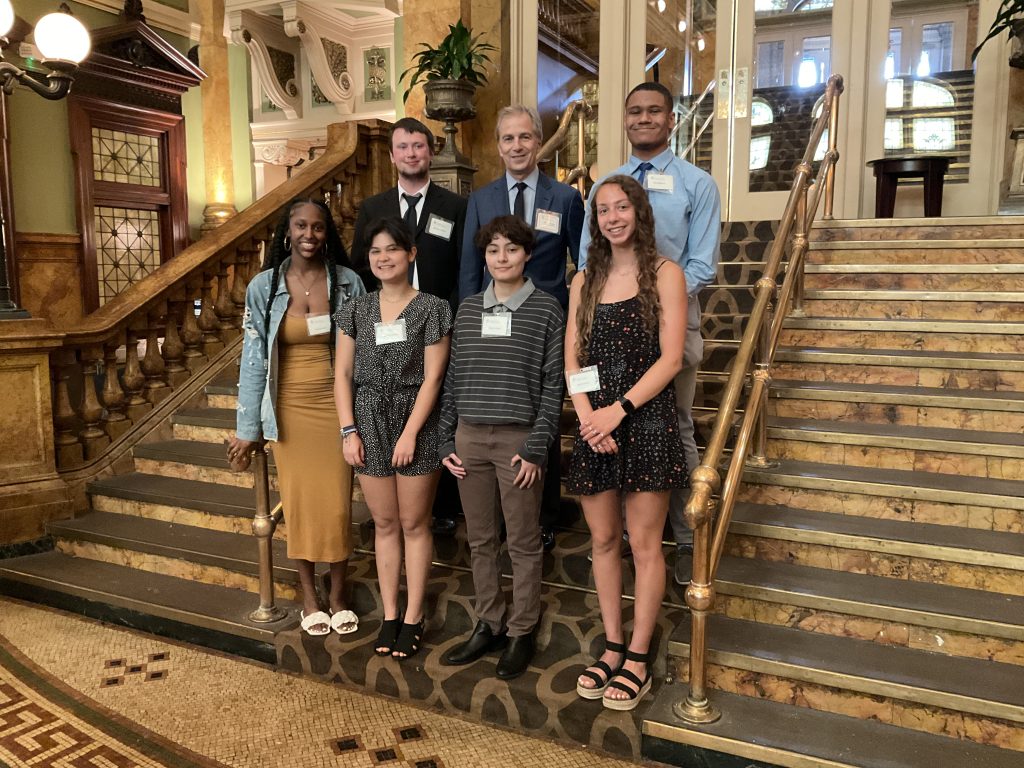
David Brashear, chairman of our Landmarks Scholarship Committee paused with scholarship and honorable mention winners at a reception held in the Grand Concourse restaurant. From top left: Maclaen Johnson, David Brashear (standing center), Clark McCord. From bottom left: Desirae Nance, Madeline Douglas, Negein Immen, Mia Schubert
David Brashear, chairman of our organization’s Landmarks Scholarship Committee presented winners of three scholarships and 11 honorable mention award recipients at a reception held at the Grand Concourse restaurant in Station Square on June 27.
The financial award for our scholarship is $6000 paid directly to the recipient’s account at the college or university of their choice. The scholarship winners include:
- Maclaen Johnson, is a graduate of Bishop Canevin High School and a Junior Councilperson of Carnegie Borough. He will study History and Political Science at the University of Notre Dame.
- Clark McCord, a graduate of Central Catholic High School, will pursue Civil Engineering and Architectural Studies at the University of Pittsburgh.
- Luke Smarra, is a graduate of Montour High School and will study Economics and Art History at Tulane University.
Eleven students received $250 as a one-time honorable mention award, which will also be paid directly to their accounts at their college or university of choice. Honorable mention recipients include:
- Madeline Douglas a graduate of Woodland Hills High School will study biomedical engineering at Columbia University.
- Negein Immen a graduate of Pine Richland High School will study Civil Engineering at Penn State University.
- Desirae Nance, a graduate of Sewickley Academy will study Chemical Engineering at Hampton University.
- Mia Schubert, a graduate of Shaler Area High School, will stud Biology and Business at Juniata College.
- Aubree Arelt, a graduate of Serra Catholic High School, will study Economics at West Virginia University.
- Christian Cropper, a graduate of Eden Christian Academy, will study business at Hope College.
- Christian Duckworth, a graduate of North Allegheny Senior High School, will study Architecture at Rensselaer Polytechnic Institute.
- Madison Martin, a graduate of Sewickley Academy, will study Psychology at New York University.
- Elizabeth Neel, a graduate of Pittsburgh CAPA will study Early Education at Temple University
- Hailey Shevitz, a graduate of Pittsburgh Allderdice will study International Relations at the University of Wisconsin-Madison.
- Melaina Thompson, a graduate of Pittsburgh CAPA will study Art at Cornell University.
Since 1999, our organization’s Scholarship Committee has awarded 85 scholarships, payable over four years, and 51 honorable mentions, a one-time gift. In doing so, we have connected with 136 high-achieving, community-minded young people who care deeply about the Pittsburgh region and recognize the value of historic preservation.
This program is funded by the Brashear Family Fund, Scholarship Committee members, and the Landmarks Scholarship Fund, including donations to the 2008 and 2014 Scholarship Celebrations. We thank each donor for supporting this program that helps young people achieve their educational goals and stay connected to the Pittsburgh region through our organization.

